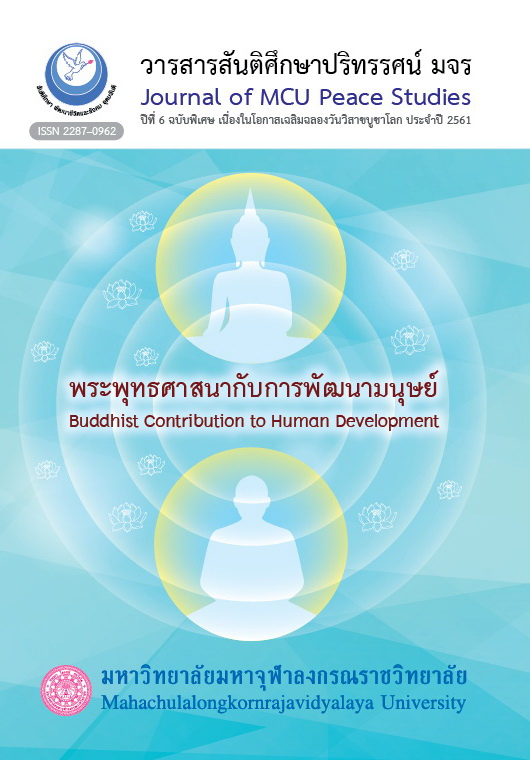Guidelines for appication of Buddhadhamma in Sambāravipāka to life Development
Main Article Content
บทคัดย่อ
This dissertation aimed 1) to study of Sambhāravipāka, 2) to study of the
Buddhadhamma to life Development in Sambhāravipāka, and 3) to study of the way of
Buddhadhamma application in SSambhāravipāka to life development.
From the study of the values and significance of Sambhāravipāka is found that the
perfection (Pāramī) is the practical method of Bodhisattava who collecting goodness to be
a Buddha. Sambhāravipāka is the result of Sambhãra which means the collection of
goodness. Therefore, we must maintain the valuationand significance of Sambhāravipāka
to next Buddhist generations.
The important Buddhadhamma appeared in Sambhāravipāka Scriptures, the
researcher has abstracted from the scripture into three categories, namely, the principle
about the Lord Buddha, the principle about the nature, and the principle about practice.
There are 12 principles, namely, the thirty perfections (Pāramī), the thirty-two Marks of the
Great Man (Mahāpurisalakkhan.
a), the eighty Subsidiary Characteristics (Anubyañjana), the
nine Buddha’s virtues (Buddhagun.
a), the three characteristics (Ti-Lakkan.
a), the Dependent
Originations (Patฺccasamuppãda), the Law of Kamma, the four Foundations of Mindfulness
(Sati-Patฺtฺhãna), the four Great Efforts, and the four Paths of Accomplishment (Iddhipãda).
This part is what the Buddha preached the benefits of the practice of the four Iddhipãdas
to Ananda at Pāvālacetiya. Another part of this scripture just appears only the title of
principles.
The way of Buddhadhamma application in Sambhāravipāka to life development
is the development of life quality in Buddhism, it is divided into four sides, e.g.,
(1) behavioral development is conduct by body and speech to have morality, (Sila).
(2) Development of the six faculties (Indriya) is to control one’s faculties by mindfulness,
(Sathi) (3) mental development is to make a strength and stability to work efficiently,
(Smathi) and (4) intellectual development is to gain knowledge and understanding of
oneself practice to all things, not to be infatuated, be freedom from all things (Panya).
Article Details
ทัศนะและความคิดเห็นที่ปรากฏในบทความในวารสาร ถือเป็นความรับผิดชอบของผู้เขียนบทความนั้น และไม่ถือเป็นทัศนะและความรับผิดชอบของกองบรรณาธิการ ยินยอมว่าบทความเป็นลิขสิทธิ์ของวารสาร


